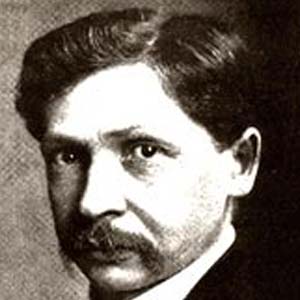Vinchevsky Moritz (Benzion Novakhovich, August 9, 1856, Kaunas, Lituania – March 18, 1932, New York), a Jewish writer, initiated the radical socialist literature in Yiddish. He also wrote in Hebrew. The first works of Vinchevsky in Hebrew appeared in 1873 in the newspaper “Ha-Maggid”. Early became close with the socialist circles and became acquainted with radical Russian literature.
In 1877 Vinchevsky left for Germany, where he joined the ranks of the German Social-Democratic Party. In Koenigsberg, he founded a monthly Hebrew journal, Asefat hahamim, in which he published a series of poems, short stories and articles imbued with socialist ideas. In 1878 he was arrested on charges of “socialist-nihilistic conspiracy” and expelled from the limits of Prussia.
At the end of 1879 Vinchevsky settled in London, where he remained for 15 years, leading active socialist propaganda. In 1884 he founded and edited the first socialist newspaper in Yiddish “Der Gladler Idle”. The main goal of Vinchevsky’s literary activity at that time was to awaken in the Jewish working masses an awareness of their burdensome situation and to acquaint the readers with the ideals of socialism. In 1894 Vinchevsky moved to New York. From 1897 he took part in the publication of the socialist newspaper Vorverts and edited the social and literary magazines Tsukunft and Der Emes. At the same time he continued to engage in literary creation and the translation of European literature into Yiddish.
The works of Vinchevsky are imbued with love for the destitute and a deep sense of belonging to the destiny of the Jewish people. In 1921, Vinchevsky broke with many socialist friends and joined the Communist Party of the United States. In 1924-25 he spent several months in the USSR. Vinchevsky’s poems had a certain influence on Soviet poetry in Yiddish from the 1920s and 1930s.


10 thoughts on “Kaminos”
Was Nicholas related to Alexander Saslavsky who married Celeste Izolee Todd?
Anyone have a contact email for Yair Klinger or link to score for Ha-Bayta?
wish to have homeland concert video played on the big screen throughout North America.
can organize here in Santa Barbara California.
contacts for this needed and any ideas or suggestions welcomed.
Nat farber is my great grandpa 😊
Are there any movies or photos of max kletter? His wife’s sister was my stepmother, so I’m interested in seeing them and sharing them with his wife’s daughter.
The article says Sheb recorded his last song just 4 days before he died, but does not tell us the name of it. I be curious what it was. I’d like to hear it.
Would anyone happen to know where I can find a copy of the sheet music for a Gil Aldema Choral (SATB) arrangement for Naomi Shemer’s “Sheleg Al Iri”. (Snow on my Village)?
Joseph Smith
Kol Ram Community Choir, NYC
שלום שמעון!
לא שכחתי אותך. עזבתי את ישראל בפברואר 1998 כדי להביא את בני האוטיסט לקבל את העזרה המקצועית שלא הייתה קיימת אז בישראל. זה סיפור מאוד עצוב וטרגי, אבל אני הייתי היחיד עם ביצים שהביא אותו והייתי הורה יחיד בשבילו במשך חמישה חודשים. הוא היה אז בן 9. כעת הוא בן 36 ומתפקד באופן עצמאי. נתתי לו הזדמנות לעתיד נורמלי. בטח, אבות כולם חרא, אומרים הפמינציות, אבל כולם צריכים לעבוד כמטרות במטווחי רובה!
משה קונג
(Maurice King)
Thank you for this wonderful remembrance of Herman Zalis. My late father, Henry Wahrman, was one of his students. Note the correct spelling of his name for future reference. Thank you again for sharing this.
Tirza Wahrman (Mitlak)
amazing zchuso yagein aleinu, he wrote the famous niggun Lefichuch that is sung in almost every Israeli Yeshiva